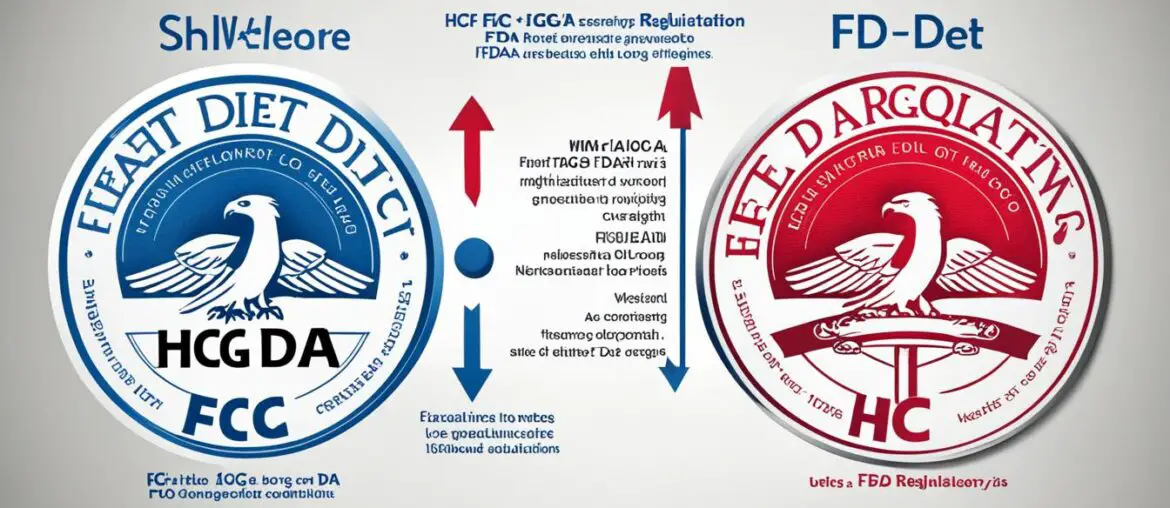Did you know that the Food and Drug Administration (FDA) does not approve of the HCG (human chorionic gonadotropin) diet for weight loss? While HCG is approved as a prescription drug for certain medical conditions, it is not approved for weight loss purposes. This surprising fact raises questions about the safety and effectiveness of the HCG diet.
The FDA’s Stance on HCG Weight-Loss Products
When it comes to HCG weight-loss products, the FDA has a clear stance. These products, which claim to contain HCG and are often marketed with a very low-calorie diet, are not approved by the agency.
The FDA has actually approved HCG as a prescription drug, but only for the treatment of female infertility and other medical conditions. It is not approved for weight loss purposes. Despite this, many HCG weight-loss products make bold claims of resetting metabolism and promising rapid weight loss.
However, the FDA warns against using HCG products for weight loss due to the severe calorie restriction and potential side effects. There is no substantial evidence to support the claims made by these products.
Using HCG in the context of weight loss can be dangerous, and individuals should be cautious when considering these products. It is essential to prioritize safe and approved methods for weight loss, in line with FDA regulations and guidelines.
Unproven Claims and Potential Risks
Despite the marketing claims surrounding HCG weight-loss products, the data simply do not support these assertions. There is no scientific evidence to suggest that HCG increases weight loss beyond that resulting from caloric restriction alone. It is important to approach these products with skepticism and recognize the potential risks associated with their use.
“Using HCG products for weight loss can be dangerous, as the severe calorie restriction may lead to various adverse effects.”
The severe calorie restriction involved in HCG weight-loss protocols, often restricted to 500 calories a day, can have harmful consequences for health. These risks include gallstone formation, electrolyte imbalances, irregular heartbeat, and nutrient deficiencies. Very low-calorie diets should only be undertaken under strict medical supervision.
FDA Approved Weight Loss Solutions
For individuals seeking safe and effective weight loss solutions, the FDA recommends following approved methods such as consuming a balanced diet and engaging in regular exercise. These approaches ensure the intake of adequate nutrients and minimize the potential side effects associated with extreme calorie restriction.
Consulting with a healthcare professional can provide personalized guidance and support in developing a weight loss plan in line with FDA standards. It is crucial to prioritize health and well-being when considering weight loss methods and to seek evidence-based approaches that align with FDA-approved guidelines.
| FDA-Approved Weight Loss Solutions | Benefits |
|---|---|
| Consuming a balanced diet | Provides essential nutrients and supports overall health |
| Engaging in regular exercise | Promotes calorie burning, muscle toning, and cardiovascular health |
| Working with a healthcare professional | Offers personalized guidance and ensures safety and efficacy |
Risks of the HCG Diet
The HCG diet, which involves severe calorie restriction, is considered unhealthy and unsafe by the FDA. Living on only 500 calories a day can lead to various health risks, including gallstone formation, electrolyte imbalances, irregular heartbeat, and nutrient deficiencies.
Very low-calorie diets should only be undertaken under strict medical supervision. These diets, such as the HCG diet, may offer rapid weight loss, but they often lack essential nutrients needed for overall health and well-being.
Severe calorie restriction can cause the body to enter a state of starvation mode, where it conserves energy and slows down metabolism. This can make it difficult to sustain weight loss in the long term, as the body adapts to the reduced calorie intake.
The FDA advises individuals to pursue safe and healthy weight loss methods. Consuming a balanced diet that includes a variety of nutrients is essential for overall health and sustainable weight loss. Regular physical activity, such as engaging in exercise, can also support weight management and improve overall well-being.
| Risks of the HCG Diet | Safe and Healthy Weight Loss Methods |
|---|---|
|
|
It is crucial to prioritize safety and well-being when considering weight loss methods. Sustainable and healthy weight loss requires a holistic approach that takes into account individual needs and goals.
Consulting with a Healthcare Professional
Before embarking on any weight loss program, it is advisable to consult with a healthcare professional. They can provide guidance and support tailored to specific health conditions, dietary needs, and personal preferences.
FDA’s Actions Against HCG Weight-Loss Products
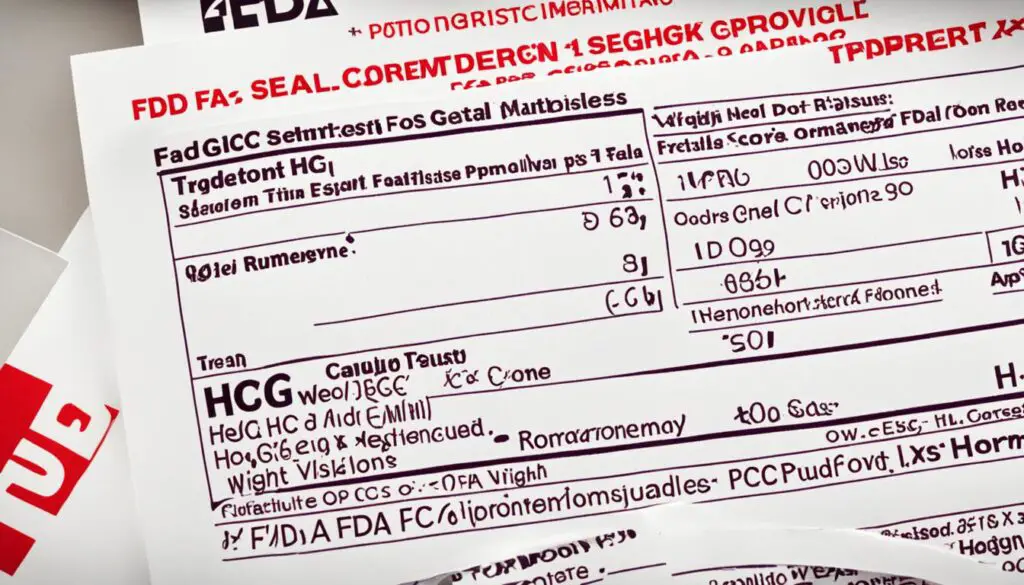
The Food and Drug Administration (FDA) and the Federal Trade Commission (FTC) have taken decisive action against companies that market over-the-counter HCG drug products labeled as homeopathic for weight loss. These firms have received warning letters from the FDA and FTC for violating federal laws by selling unapproved and misbranded drugs that make unsubstantiated claims about weight loss.
The FDA holds a strong stance against these “homeopathic” HCG products, as it has not evaluated their safety or effectiveness. The marketing of such products is considered illegal by the FDA, as they do not meet the regulatory guidelines set by the agency.
“The FDA and the FTC have issued warning letters to companies marketing unapproved HCG weight-loss products labeled as homeopathic. These firms are in violation of federal law by selling unapproved and misbranded drugs that make unsubstantiated claims about weight loss.” – FDA
The FDA takes these actions to protect consumers from potentially harmful products and misleading claims. By addressing the issue and issuing warning letters, the FDA aims to ensure that individuals seeking weight loss have access to safe and effective methods that align with FDA guidelines.
FDA Enforcement Actions Against HCG Products
| Date | Company | Product | Action |
|---|---|---|---|
| June 2020 | Company A | HCGX Weight-Loss Drops | Warning Letter |
| January 2021 | Company B | Homeopathic HCG Diet Pellets | Injunction |
| March 2021 | Company C | HCG Ultra Diet Pills | Cease and Desist Order |
This table provides a glimpse of the FDA’s actions against specific companies marketing HCG weight-loss products. These enforcement actions demonstrate the FDA’s commitment to ensuring consumer safety and upholding the standards set by FDA regulations for the HCG diet.
Stay informed and aware of FDA guidelines when considering weight-loss products or diet plans. It is crucial to prioritize safety and consult with healthcare professionals before embarking on any weight-loss journey. By doing so, individuals can make informed decisions that align with FDA-approved methods and promote long-term health and well-being.
Concerns about Homeopathic HCG Products
The FDA has expressed significant concerns regarding the use of homeopathic HCG drug products that are marketed for weight loss purposes. It is important to note that there is no FDA-approved HCG product specifically designed for weight loss, and the effectiveness of HCG as a therapy for obesity has not been demonstrated.
The labeling of homeopathic HCG products often includes recommendations for a very low-calorie diet, which can pose serious risks to individuals. These risks include the formation of gallstones, imbalances in electrolyte levels, and irregular heart rhythms. It is crucial to understand that a very low-calorie diet should only be followed under the supervision of a qualified healthcare professional.
“The FDA is deeply concerned about the use of homeopathic HCG products for weight loss. There is no scientific evidence to support the claims made by these products, and the potential risks associated with following a very low-calorie diet are significant.” – FDA Spokesperson
Consumers need to be aware of the potential risks associated with homeopathic HCG products and understand that these products have not undergone FDA approval for weight loss purposes. It is crucial to prioritize safety and explore FDA-approved diet plans for achieving weight loss goals. Consulting with a healthcare professional can provide guidance on safe and effective weight loss methods that align with FDA compliance and standards.
Key Concerns:
- Lack of FDA approval for HCG products for weight loss
- Effectiveness of HCG as a therapy for obesity not demonstrated
- Potential risks of following a very low-calorie diet
It is important for individuals to make informed decisions about their weight loss journeys and recognize the potential risks associated with unapproved HCG products. Prioritizing FDA-approved diet plans can help ensure the use of safe and effective methods for achieving long-term weight loss goals.
Safety and Effectiveness of Prescription HCG Products
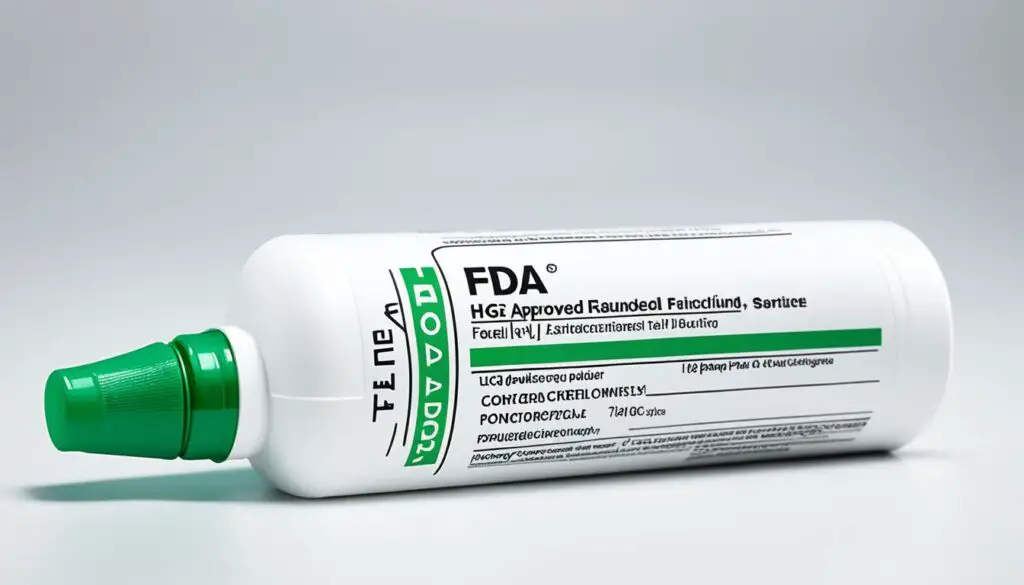
Prescription HCG products, approved by the FDA for certain medical conditions, are not considered safe and effective for weight loss purposes. Although these products have FDA approval for specific medical uses, they have not been approved for weight loss. In fact, there is no substantial evidence supporting their efficacy in treating obesity. The use of HCG injections for weight loss has been associated with serious adverse events, including pulmonary embolism, depression, cardiac arrest, and even death.
Research and studies have failed to demonstrate the effectiveness of prescription HCG products in promoting weight loss beyond what can be achieved through caloric restriction alone. These products are not regulated or evaluated by the FDA for their weight loss claims. It is important to note that the use of HCG for weight loss is considered an off-label use, which means it is not the intended or approved use by the FDA.
Using prescription HCG products for weight loss without proper medical supervision can be extremely risky. The potential side effects and adverse events associated with HCG injections emphasize the importance of considering safe and evidence-based weight loss alternatives.
Regulated and approved by the FDA for specific medical conditions, prescription HCG products are not intended or established as safe and effective for weight loss. Misusing these products for weight loss without medical guidance can lead to severe complications, including life-threatening events.
Contrasting Prescription HCG with Non-Prescription HCG Products
To further comprehend the safety and effectiveness of HCG products, it is crucial to differentiate between prescription and non-prescription HCG options. While prescription HCG products undergo rigorous evaluations and are regulated by the FDA for specific medical conditions, non-prescription HCG products lack such scrutiny. Non-prescription HCG products, often marketed as homeopathic or over-the-counter remedies, are not FDA-approved for any purpose. Their claims regarding weight loss are unsubstantiated and potentially hazardous. These products may contain unreliable amounts of HCG or no HCG at all, and their production and distribution do not adhere to FDA guidelines.
HCG Diet Standards
The use of HCG injections as part of the HCG diet is not supported by FDA-approved weight loss standards and is considered medically unsafe. The HCG diet’s reliance on severe calorie restriction, combined with potential stimulation of hormonal levels, raises concerns about its impact on overall health and well-being. The FDA encourages individuals seeking weight loss to pursue safe and evidence-based methods, such as adopting a balanced diet and engaging in regular exercise. Consulting with healthcare professionals who follow FDA-approved weight loss standards can provide personalized guidance and ensure a healthier approach to achieving weight loss goals.
| Prescription HCG Products | Non-prescription HCG Products |
|---|---|
| FDA-approved for specific medical conditions | Not FDA-approved for any purpose |
| Rigorous evaluations and FDA regulation | Lack of FDA scrutiny and regulation |
| No substantial evidence supporting weight loss efficacy | Unsubstantiated weight loss claims |
| Associated with serious adverse events | Potential for unreliable HCG content |
The Potential Risks of HCG Injections
Recent studies have shed light on the potential risks associated with using HCG injections for weight loss. One prominent concern is the increased risk of pulmonary embolism, a life-threatening condition characterized by a blood clot that travels to the lungs. Additionally, HCG injections have been linked to depression and mood swings, which can impact mental well-being and overall quality of life. Cardiac arrest, a sudden loss of heart function, and even death have also been reported as possible adverse events associated with HCG usage for weight loss.
It is crucial to prioritize safety when considering weight loss options, and prescription HCG products are not aligned with these principles. Opting for FDA-approved weight loss methods can help individuals avoid potential harm and achieve sustainable, healthy weight loss.
Recommendations for Consumers
As a healthcare professional, I strongly advise consumers who are using “homeopathic” HCG products for weight loss to discontinue their use immediately. These products are not approved by the FDA and do not adhere to FDA regulations for weight loss products. It is crucial to prioritize your health and well-being by ceasing the use of these products and discarding them.
If you suspect that you have experienced any adverse effects from using HCG drug products for weight loss, it is essential to seek professional medical assistance promptly. Contact a licensed healthcare professional who can evaluate your symptoms and provide appropriate guidance based on your specific situation. Immediate medical attention is crucial to address any potential health risks associated with these products.
“The FDA encourages both healthcare professionals and consumers to report any harmful effects of using HCG for weight loss to the FDA’s MedWatch Adverse Event Reporting program.”
It is vital to report any harmful effects or adverse events related to HCG weight loss products to the FDA. By doing so, you contribute to safeguarding public health and ensuring that the appropriate steps are taken to address any potential risks. The FDA’s MedWatch Adverse Event Reporting program is a valuable resource for reporting any adverse effects and plays a significant role in monitoring the safety of weight loss products.
Recognizing the Importance of Consumer Safety
I am deeply committed to promoting consumer safety and providing accurate information to help individuals make informed decisions about their health. The FDA’s regulations for weight loss products are in place to protect consumers from potential risks and ensure that products on the market are safe and effective.
When it comes to weight loss, prioritizing safe and approved methods endorsed by the FDA is crucial. By adhering to FDA-approved weight loss solutions and following FDA recommended diet plans, you can achieve your weight loss goals while minimizing potential risks and prioritizing your overall well-being.
FDA-Approved Weight Loss Methods
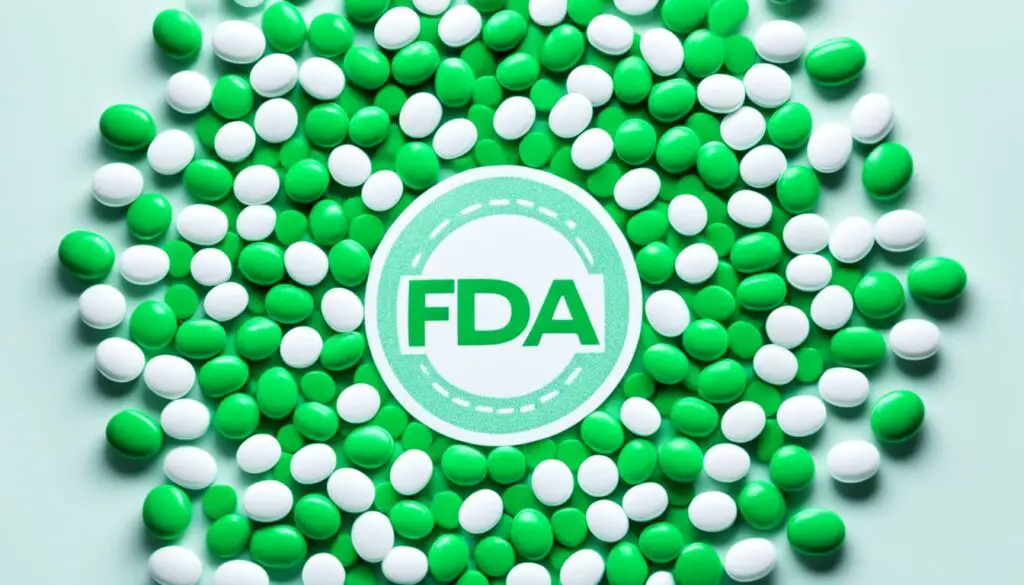
For individuals seeking weight loss, the FDA recommends safe and approved methods such as eating a balanced diet and engaging in regular exercise. Following a well-rounded approach to weight loss ensures the consumption of adequate nutrients and reduces the risk of potential side effects associated with extreme calorie restriction. Consulting with a healthcare professional can help develop a personalized weight loss plan that meets individual needs.
The Benefits of FDA-Approved Weight Loss Solutions
Choosing FDA-approved weight loss solutions offers numerous benefits for individuals looking to shed excess pounds. These solutions have undergone rigorous testing and evaluation by the FDA to ensure their safety and effectiveness. By opting for FDA-approved diet plans, individuals can have confidence in the quality and reliability of the programs they are following.
“FDA-approved weight loss methods provide individuals with scientifically backed strategies for achieving their weight loss goals.”
Benefits of a Balanced Diet
Eating a balanced diet is a fundamental aspect of healthy weight loss. By including a variety of fruits, vegetables, whole grains, lean proteins, and healthy fats in their meals, individuals can ensure they are getting the necessary nutrients to support optimal health while promoting weight loss.
A balanced diet provides essential vitamins, minerals, and antioxidants necessary for overall well-being. It allows individuals to maintain energy levels, control hunger, and support their body’s natural fat-burning processes. Additionally, a balanced diet helps individuals develop sustainable eating habits that can be maintained in the long term.
Benefits of Regular Exercise
Regular exercise is another key component of FDA-approved weight loss methods. Engaging in physical activity not only burns calories but also helps build lean muscle mass, which increases metabolism and contributes to weight loss. Regular exercise has numerous other benefits, including improved cardiovascular health, increased strength and endurance, and enhanced mood.
The FDA recommends incorporating a combination of aerobic exercise, such as brisk walking or cycling, and strength training exercises into one’s fitness routine. This balanced approach ensures the body is effectively burning calories and building muscle, resulting in steady and sustainable weight loss.
Consulting with a Healthcare Professional
When embarking on a weight loss journey, it is highly recommended to consult with a healthcare professional. A qualified healthcare provider can assess an individual’s specific needs and provide personalized guidance and support throughout the weight loss process.
A healthcare professional can help determine the most appropriate FDA-approved diet plan based on factors such as age, gender, medical history, and lifestyle. Additionally, they can monitor progress, address any concerns or obstacles, and provide valuable advice on nutrition and exercise.
Summary
In conclusion, FDA-approved weight loss methods offer individuals safe and effective strategies for achieving their weight loss goals. By following a balanced diet, engaging in regular exercise, and consulting with a healthcare professional, individuals can embark on a successful weight loss journey with confidence. Remember, it’s important to prioritize your health and well-being while striving for a healthier weight.
The FDA’s Evaluation of HCG Diet Products
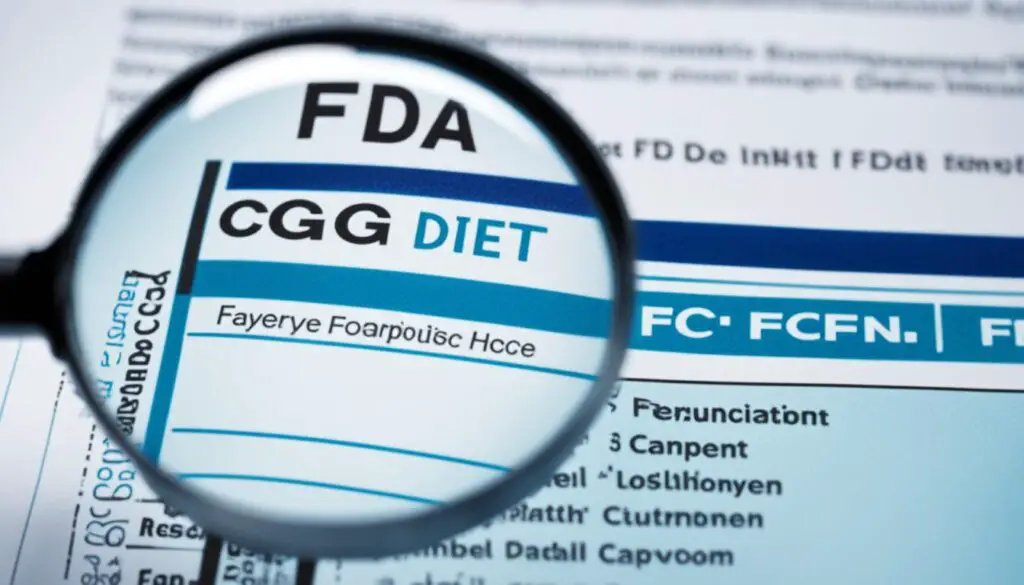
The FDA plays a crucial role in evaluating the safety and effectiveness of various medical products, including weight loss solutions. When it comes to the HCG diet, the FDA has not conducted an evaluation that supports its use for weight loss purposes. This evaluation is based on the lack of scientific evidence available to support the claims made by products associated with the HCG diet.
The FDA emphasizes that there is no substantial evidence demonstrating that HCG increases weight loss beyond that resulting from caloric restriction. In other words, any weight loss experienced while on the HCG diet is likely due to the severe calorie restriction it entails, rather than any inherent properties of HCG itself.
The agency’s evaluation also states that HCG does not offer any specific benefits in terms of fat distribution or hunger reduction. While proponents of the HCG diet may claim these benefits, the FDA’s findings suggest otherwise. It is important for individuals considering the HCG diet to be aware of the FDA’s evaluation and the lack of scientific evidence supporting its effectiveness.
Quotes:
“The FDA has not evaluated the safety or effectiveness of HCG diet products for weight loss. The agency’s evaluation is based on the lack of scientific evidence supporting the claims made by these products.”
Key Points:
- The FDA has not evaluated the safety or effectiveness of HCG diet products for weight loss.
- HCG does not increase weight loss beyond that resulting from caloric restriction.
- There is a lack of scientific evidence supporting the claims made by products associated with the HCG diet.
- HCG does not offer specific benefits in terms of fat distribution or hunger reduction.
| Points | Evaluation of HCG Diet Products |
|---|---|
| Safety | Not evaluated by the FDA |
| Effectiveness | No substantial evidence supporting claims |
| Weight Loss | HCG does not increase weight loss beyond caloric restriction |
| Benefits | No specific benefits in terms of fat distribution or hunger reduction |
It is always important to consult with a healthcare professional before starting any weight loss program, including the HCG diet. They can provide personalized guidance and ensure that any weight loss approach aligns with FDA guidelines and safety standards.
Reviewing the HCG Diet Controversy

The HCG diet has been the subject of controversy due to its severe calorie restriction and the dubious claims made by HCG weight-loss products. While some individuals may experience short-term weight loss on this diet, it is crucial to note that the weight loss is most likely a result of the calorie restriction itself, rather than any specific effects of HCG.
The FDA’s view on the HCG diet, supported by scientific evidence, is clear: it is not an approved method for weight loss.
“The HCG diet has attracted attention due to its extravagant claims and extreme dietary restrictions. However, scientific research has consistently shown that the weight loss associated with this diet is primarily due to severe calorie restriction, not the effects of HCG.”
– FDA spokesperson
It is important to consider the FDA’s stance when evaluating the safety and effectiveness of weight loss methods. The FDA regulates and approves drugs and treatments based on extensive research and data. With regard to the HCG diet, the lack of substantial evidence supporting its efficacy and the potential risks associated with severe calorie restriction have led the FDA to conclude that it is not a recommended approach for weight loss.
The Controversy Surrounding the HCG Diet
The controversy surrounding the HCG diet stems from a combination of factors:
- The promotion of severe calorie restriction, which can have adverse effects on health and well-being
- The marketing of HCG weight-loss products with claims that lack scientific evidence
- The absence of FDA approval for HCG as a weight loss treatment
It is important for consumers to critically evaluate weight loss methods and consider the guidance of trusted healthcare professionals. With the abundance of available options, it is crucial to prioritize safe and effective approaches that align with FDA guidelines.
| Issues with the HCG Diet | Impact on Health | Scientific Evidence |
|---|---|---|
| Severe calorie restriction | Potential health risks such as nutrient deficiencies and electrolyte imbalances | No substantial evidence supporting the claim that HCG enhances weight loss |
| Unsubstantiated claims by HCG weight-loss products | Consumers may be misled by false promises and ineffective treatments | No FDA approval for HCG as a weight loss treatment |
| Lack of regulation and oversight | Potential for the proliferation of unsafe and untested products | Limited research on the safety and efficacy of the HCG diet |
The table above provides a summary of the main issues associated with the HCG diet. It highlights the impact on health, the lack of scientific evidence supporting its effectiveness, and the absence of FDA approval as a weight loss treatment.
Given the controversy surrounding the HCG diet and the FDA’s position on its use for weight loss, individuals seeking to lose weight should prioritize safe and evidence-based methods recommended by healthcare professionals.
Conclusion
In conclusion, the FDA does not approve of the HCG diet for weight loss purposes. HCG weight-loss products marketed with severe calorie restriction are not proven to increase weight loss beyond that resulting from caloric restriction alone. The FDA advises against using these products due to their potential risks and lack of evidence for efficacy. Individuals seeking weight loss should consult with healthcare professionals for safe and effective weight loss methods that align with FDA guidelines.
FAQ
Is the HCG Diet FDA Approved?
No, the HCG (human chorionic gonadotropin) diet is not approved by the FDA for weight loss purposes.
What is the FDA’s stance on HCG weight-loss products?
The FDA does not approve of HCG weight-loss products that are marketed with a severely restrictive diet.
What are the risks of the HCG diet?
The HCG diet, which involves severe calorie restriction, is considered unhealthy and unsafe by the FDA.
What actions has the FDA taken against HCG weight-loss products?
The FDA and FTC have issued warning letters to firms marketing over-the-counter HCG drug products labeled as homeopathic for weight loss.
What are the concerns about homeopathic HCG products?
The FDA is concerned about the use of homeopathic HCG drug products marketed for weight loss.
Are prescription HCG products safe and effective for weight loss?
Prescription HCG products, which are approved by the FDA for certain medical conditions, are not deemed safe and effective for weight loss.
What recommendations does the FDA have for consumers?
The FDA advises individuals to pursue safe and healthy weight loss methods, such as consuming a balanced diet and engaging in regular exercise.
What are FDA-approved weight loss methods?
The FDA recommends safe and approved methods such as eating a balanced diet and engaging in regular exercise for weight loss.
What is the FDA’s evaluation of HCG diet products?
The FDA has not evaluated the safety or effectiveness of HCG diet products for weight loss.
What is the controversy surrounding the HCG diet?
The HCG diet has sparked controversy due to its severe calorie restriction and the unsubstantiated claims made by HCG weight-loss products.

